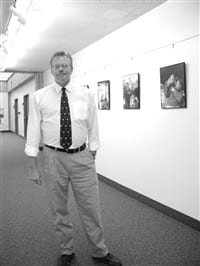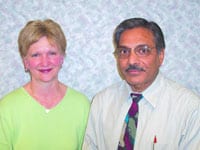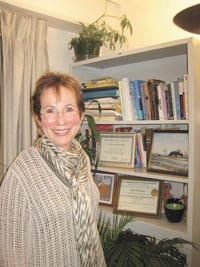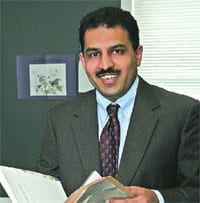Back To The Future HCC Offers Nursing Refresher Course To Address The Area’s Ongoing Nursing Shortage
When looking at ways to address the persistent nursing shortage in Western Mass., Holyoke Community College found a two-pronged problem: facilities are scrambling to fill nursing positions, but licensed nurses looking to return to the field after an absence are finding that their skills are no longer up-to-date in today’s ever-changing health care world.
The school hopes to address both problems through a pilot program that began this fall; a nursing refresher course designed to ready licensed registered nurses for nursing jobs in the area’s hospitals and assisted living facilities.
With absences from the field ranging from three to 20 years, the seven students now enrolled in HCC’s first nursing refresher course are essentially studying what it means to be a nurse in today’s health care world. The 11-week course covers everything from patient care and medical administration to cultural diversity, pediatric and geriatric trends, and nursing documentation, which in part addresses the practices that are now commonplace due to HIPAA regulations for patient privacy and hospital security.
Beth Fiscella, a registered nurse and a geriatric and clinical specialist, is serving as the program’s director and primary instructor. She said the nurses enrolled in the refresher course have retained their licensing in Massachusetts in order to re-enter the field, but felt some apprehension about returning to a profession that has seen many changes in recent years.
“They read the news and see issues like the flu vaccine shortage, stem cell research, HIPAA, and of course, the nursing shortage on the front page,” she said. “They are a little nervous about getting into it, but they seem to be getting up to speed nicely.”
Fiscella said forming a support system and paying attention to current trends in nursing has become a large part of the course, in addition to studying more clinical subjects such as pain management and wound care.
“One of the subjects they are studying is the role of the registered nurse in 2004,” she said. “We look at the challenges they will face, and the part registered nurses play in protecting the public.”
After 22 hours of theory-based study, Fiscella said the nurses will complete 60 hours of clinical training in area hospitals and assisted living facilities. The clinical portion of the course is intensive – the students must complete five 12-hour shifts before receiving a certificate of completion of the course from HCC. But the college’s dean of Workforce Development, Keith Hensley, said the exhaustive nature of the program is a proactive measure to help licensed nurses re-join the workforce, thus helping to alleviate the nursing shortage.
“At this point, some of them may not be able to return to nursing without a refresher, because their skills don’t match what facilities need,” he explained. “The very reason this program was developed was to address changes in the nursing field. At some point, these students knew they would be returning to nursing, but now they need their skills to be up-to-date. After this course, with a certificate of completion in hand, I have no doubt that it will be fairly easy for the students to find work in the area.”
Hensley added that the course is being funded by grants from the Common-wealth Corporation and the Regional Employment Board of Hampden County, which each released requests for proposals in search of organizations hoping to develop programs to provide training and education to Massachusetts residents, in order to bolster the job market. The nursing shortage was of particular interest to both groups, and the grant awarded to HCC, a Nursing Career Ladder Initiative (NuCLI) grant, allowed the college to offer the course, as well as the necessary text books, free of charge to students.
Fiscella and Hensley both expect the fledgling program to be offered again, perhaps as early as the spring semester. Because the program is tailored to registered nurses and working adults who may have families and other obligations to juggle, the course does not coincide with the college’s regular semester schedule, and can instead be offered as need arises. Hensley said he hopes to increase the numbers of students enrolled in the program to about 12, and to eventually offer the program as part of the college’s Allied Health Institute’s regular curriculum.
“We see this program as a complement to HCC’s LPN and RN programs,” he said, “and necessary to help the region’s health care facilities to obtain the licensed nurse staffing they so desperately need.”





Comments are closed.